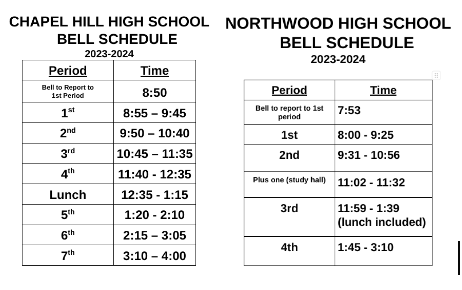Imagine a day free from interrupting transitions, ample time to complete homework in class, time in the evening to engage in hobbies and socialize with loved ones. You can participate in extracurriculars without thinking about the piles of work awaiting you when you get home, and homework doesn’t cut into a good night’s sleep.
The block schedule is here to make that dream a reality. As a transfer student whose previous school, Northwood High School, follows a block schedule, I can say block scheduling is a million times more sustainable in terms of workload, time management and flexibility.
At Northwood, the block schedule entailed four classes a semester, with the classes changing in the second semester—a switch that can provide a nice change of pace if you dislike a class or simply want to take a different one midyear. Oftentimes, I find myself burning out after break, and coming back to the same tired classes can be exhausting.
Junior Marleigh Pitman, like a lot of students at the school, said she feels less motivated as the school year advances. “I definitely start to feel unmotivated the deeper into the year we get,” she said. A block schedule can combat the lack of motivation students tend to feel midway through the year. For this reason, Pitman said she can see the appeal of a block schedule; other students should, as well.
Especially in an environment like Chapel Hill High School, which is so competitive and high achieving, the block schedule could really benefit these worn-out students. Students can explore more of their interests. For example, students can take two years’ worth of art classes within a single school year; students who are more math- or science-oriented can do something similar in their discipline of choice.
Some may say that the block schedule rushes year long classes, but I can confidently say that not once in my time with the block schedule did I feel like I was being hurried, or that teachers were trying to cram necessary information in too small of a window. And something you might not know is that the block schedule accommodates yearlong classes, such as special electives or Advanced Placement courses.
Along with being easier for students, the block schedule can be preferable for teachers since it gives them more time for individual lessons. Science teachers, for instance, have more time to devote to labs with the block schedule. The seven-period schedule can be disruptive: just when you’ve really gotten into a flow with your work, the bell rings and you’re launched into a new subject. For students or teachers who struggle with too many transitions during the day, the block schedule eliminates that problem with fewer transitions and, in turn, minimal disruptions.
All in all, the block schedule is a lot easier to manage in terms of workload. Maybe it’s because Chapel Hill is such an education-driven community, but I felt as though I got academic whiplash when I transferred to Chapel Hill High School, and a large part of that is due to the schedule. It is significantly easier for me to manage four classes’ worth of homework rather than seven. For students looking for a better school/life balance, the block schedule is for you. It’s a win-win for everyone and should be implemented at Chapel Hill High School.
